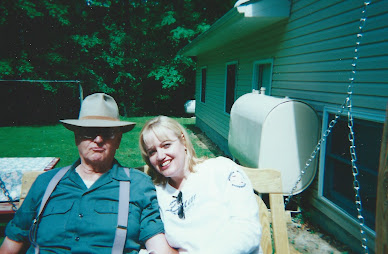Robert Haskins, “Daddy”, as he was called by all who knew him, was an old man by the time I first met him although he wasn't as old as I am today. When I was 10 or 12 years old, Daddy came to live with my Grandpa and Grandma Harris in Coneville. He lived with them for three or four years since he could no longer live alone and had no one to help. Daddy lived with my grandparents up to the week before he died at the County Farm at Coudersport.
 |
| My Grandparents, Ernest and Lottie Harris, on back porch of their home. "Daddy" Haskins lived with them for a few years. |
 |
| Ernest and Lottie Harris Home on Route 44, Coneville, PA |
As a younger man, Daddy had worked in logging and wood cutting camps, filed saws and old axes, and done other little jobs to pay for his board. By the time I met him, he had many interesting life stories for a boy my age. He told how he skidded logs with oxen and horses, and how he had been a riverman floating logs down the Oswayo Creek every spring from Coneville, PA to Weston Mills, NY. It would take two to three days to float down the creek to the mill. After they got there, the rivermen would walk back to Coneville to float more logs down the creek until the water became too low to float them.
The last job Daddy had for several years before living with my grandparents was at the chemical factory in Coneville. The factory closed in 1940 or 1941. It made charcoal, chemicals, wood alcohol, and acetate. The men who worked on the acetate floor wore wooden shoes because it was so hot it would burn their feet. The wooden shoes fit over their regular shoes. There were huge furnaces where they burned the wood to make the products. It took a lot of teams of horses to haul the chemical wood which was all hardwood and was cut 56 inches long. Many farmers hauled it in the winter when they weren’t busy in the fields. They cut and hauled it by the cord. A man who was willing to work could cut one and a half cord of wood and stack it in a day. He was paid $1.50 per cord, cut and piled.
Daddy’s wife had died before I ever met him, but he had a son and daughter. It seems that in those days everyone had a nickname. My father was called “Skinny” Harris by some people. Others had nicknames like “Stub”, “Baldy”, “Curly”, “Shorty” and “Chub” given to them. Daddy’s son Herman was nicknamed “Moony” because he had a full round face that was reddened by his abuse of alcohol. It’s sad, but true, that both Daddy’s son Moony and daughter Bessie were terribly addicted to alcohol.
Moony worked many years at the chemical factory and often came to work under the influence of his drink. One day he came to work in worse condition than usual. When Clayton R. “Stub” Lawton, the superintendent of the plant, received a phone call that higher management from New York City was going to take a plant tour that day, he pulled Moony aside. Knowing Moony’s condition, as a good neighbor and friend hoping to avoid problems, he told Moony to take the rest of the day off and to go on home early.
Supposing that Moony had followed orders and left, Stub went about the business of leading the company higher-ups on the tour. To his surprise, Moony appeared and walked up to the Big Cheese and started mouthing off.
The top officer of the company turned to Stub, “This man is drunk. Fire him!”
Moony pushed his stomach up against the Big Cheese and said, “If you think I’M drunk, you ought to see my sister Bessie!” and walked away.
For years after that, when someone wanted to impress another coworker, they would repeat the words, “If you think I’M drunk, you ought to see my sister Bessie!”
There are two comments I'd like to add concerning this story.
1. Moony went back to work the next day and worked there until the plant was closed years later. His friend had his back. “A person with unfaithful friends soon comes to ruin. But there is a friend who sticks closer than a brother." –Proverbs 18:24 (NIRV)
2. After years of battling the addiction to alcohol, Bessie became a Believer in Christ, got the victory over the addiction, and died a Christian. "But let us give thanks to God! He gives us the victory because of what our Lord Jesus Christ has done." 1 Corinthians 15;57 (NIRV)
--Darell (and Jan)


















